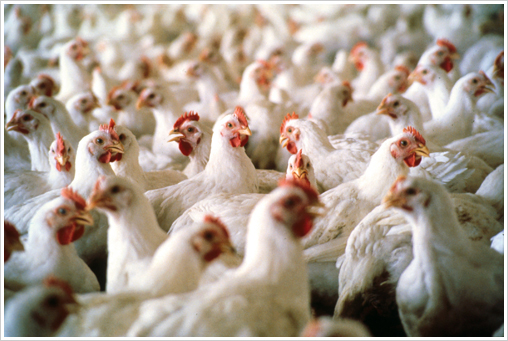
Agricultural News
NCC Responds to Article Taking Issue with Antimicrobial Use in Poultry Processing
Thu, 25 Apr 2013 12:34:02 CDT

The National Chicken Council published this response to an article appearing in the Washington Post:
Food-grade antimicrobials are approved for use by the U.S. Department of Agriculture and classified as "Generally Recognized As Safe" by the FDA at the recommended use levels as a very safe and effective way to kill or inhibit the growth of any potential foodborne pathogens, like Salmonella, on raw poultry products. They are used to assure the safety of poultry products, said the National Chicken Council (NCC) in response to claims made today in an article appearing in the Washington Post.
When administered properly at the federally recommended use levels, these antimicrobials are safe for poultry products, for consumers and for those working in the plant. These levels are frequently tested by both USDA and plant personnel to ensure they are at safe levels for the product and for workers in the plant.
Though these antimicrobials are approved for use and are used in very low, allowable concentrations, the poultry industry takes very seriously the health and safety of our workforce and there are a number of steps and precautions in place in order to minimize any exposure to them:
--When diluted antimicrobials are applied to carcasses, they are done so in controlled areas (inside of closed equipment or inside the chiller) to minimize any potential exposure to employees;
--In order to ensure proper ventilation, poultry processing plants follows strict guidelines for air flow set by the American Society of Heating, Refrigerating and Air-Conditioning Engineers. Engineering controls such as ventilation are acceptable means to control employee exposure to hazards;
--Workers and companies must comply with OSHA standards, wear personal protective equipment and complete required training programs; and
--The mixing of water and antimicrobials is a highly automated process in poultry plants so that workers rarely come into contact with any undiluted agents.
Most of these antimicrobials have a pungent odor that if an excessive concentration were to occur, it would be taken care of immediately. Therefore, continued exposure to any potential harmful level is very rare.
NCC and others in the scientific community also contested the assertion that antimicrobial use would increase if USDA's poultry inspection proposal goes through.
Among many other inaccuracies in Kimberly Kindy's article, NCC takes exception to the Post's characterization of our statement that "the volume of chemicals would increase further under the new rules because a larger volume of birds would be processed."
The volume of chicken produced is dictated by demand and the market, not line speeds or inspection systems, NCC told the Post. Increasing line speeds does not equate to more chickens being produced. More than likely it means less production time, not more chickens produced, and not more antimicrobial use.
Dr. S. F. Bilgili, a professor in Auburn University's Department of Poultry Science, and a past president of the Poultry Science Association, added, "The slight increase in processing line speeds that may occur as a result of the proposed changes to the U.S. poultry inspection system is not likely to change the antimicrobial use much, as novel application sites (i.e., use in finishing chillers rather than pre- and final chill tanks) and delivery methods (i.e., mist sprays rather than as a carcass dip) have already reduced the antimicrobial use significantly. Furthermore, novel technologies continue to be developed and commercialized to enhance the antimicrobial efficacy at lower application levels," he said.
Tom Super, NCC vice president of communications added, "We take very seriously the health and safety of everyone working in our plants. It is ironic that these inspectors, their union and their allies are claiming how bad the work environment is in the plants, yet they're fighting tooth and nail to stay in them, in an attempt to save some taxpayer-funded jobs that have proven unnecessary over the past 13 years."
A March 2012 CDC/NIOSH Health Hazard Evaluation of a poultry plant tested employees who worked in areas of the plant where antimicrobials were used the most, and found their reported symptoms (itchy eyes, sneezing, blurry vision, chest tightness) were not related to increased levels of antimicrobials. The tests that were conducted as part of this evaluation, using both area air sampling and by monitors attached to workers (personal breathing zone devices), revealed minimum, often even undetectable levels, in almost every case all well below the permissible exposure limits for chemicals set forth by OSHA.
WebReadyTM Powered by WireReady® NSI
Top Agricultural News
More Headlines...




















